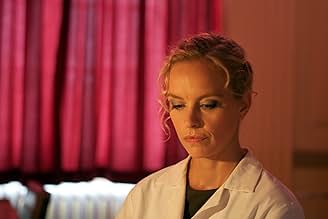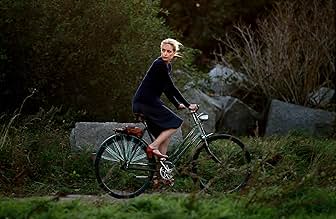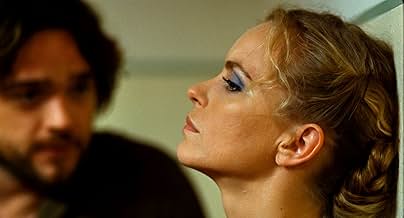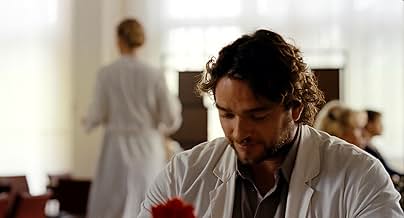Barbara
- 2012
- Tous publics
- 1h 45min
NOTE IMDb
7,2/10
17 k
MA NOTE
Une femme médecin travaillant dans les années 1980 en Allemagne de l'Est se retrouve bannie dans un petit hôpital de campagne.Une femme médecin travaillant dans les années 1980 en Allemagne de l'Est se retrouve bannie dans un petit hôpital de campagne.Une femme médecin travaillant dans les années 1980 en Allemagne de l'Est se retrouve bannie dans un petit hôpital de campagne.
- Réalisation
- Scénario
- Casting principal
- Récompenses
- 10 victoires et 24 nominations au total
Claudia Geisler-Bading
- Stationsschwester Schlösser
- (as Claudia Geisler)
Avis à la une
10yagian
I visited Eastern Europe, Berlin, Prague, and Budapest, in March 1990. At that time, the Berlin Wall had already been fallen down, but Germany had not reunited yet.
People could freely come and go over the borders between East and West Germany. I went through Checkpoint Charlie to East Berlin, and I visited retro-future TV tower and saw Ladas running on street.
In a night train from Berlin to Prague, I asked a passenger who sat next to me if Germany would reunite in a year, and he answered that he didn't believe it would happen so early. In fact, Germany reunited in October 1990.
Although I actually visited East Berlin, now, it is hardly for me to believe that the half of Germany was a communist state just twenty-three years ago.
--------------------
"Barbara" is a German film about people living in East Germany in 1980. Barbara is a female doctor, who was watched by the secret police.
It is one of the greatest German films that I have ever seen. There is no exaggeration and omission in this film. Every element in it is necessary, and I couldn't find that any things were unnecessary.
This film is very quiet, because there is no background music. That makes audience concentrated in every tiny sound. Barbara was always nervous about the secret police, so she got surprised when the doorbell started to ring, and the audience also got really surprised with the sound of the doorbell, and fully understood her emotion.
Nina Hoss, as Barbara, was also great and attractive. She didn't overplay at all, but accurately expressed how Barbara felt in her mind. After seeing her performance, most actors and actress became to look unnatural.
This film is a quiet, simple, and elegant. If you love films, I strongly recommend you to see it.
People could freely come and go over the borders between East and West Germany. I went through Checkpoint Charlie to East Berlin, and I visited retro-future TV tower and saw Ladas running on street.
In a night train from Berlin to Prague, I asked a passenger who sat next to me if Germany would reunite in a year, and he answered that he didn't believe it would happen so early. In fact, Germany reunited in October 1990.
Although I actually visited East Berlin, now, it is hardly for me to believe that the half of Germany was a communist state just twenty-three years ago.
--------------------
"Barbara" is a German film about people living in East Germany in 1980. Barbara is a female doctor, who was watched by the secret police.
It is one of the greatest German films that I have ever seen. There is no exaggeration and omission in this film. Every element in it is necessary, and I couldn't find that any things were unnecessary.
This film is very quiet, because there is no background music. That makes audience concentrated in every tiny sound. Barbara was always nervous about the secret police, so she got surprised when the doorbell started to ring, and the audience also got really surprised with the sound of the doorbell, and fully understood her emotion.
Nina Hoss, as Barbara, was also great and attractive. She didn't overplay at all, but accurately expressed how Barbara felt in her mind. After seeing her performance, most actors and actress became to look unnatural.
This film is a quiet, simple, and elegant. If you love films, I strongly recommend you to see it.
This brilliant German film explores two fundamental questions: whether it is possible to collaborate with a fundamentally oppressive state, and the acute degree of personal loneliness felt by those who cannot, and whom the state thereby treats as its enemies. The mundane depersonalisation of life under the Stasi is captured much more acutely, it seems to me, in this story than in the more acclaimed 'The Lives of Others'; that the leading collaborator is arguably a decent and attractive person, albeit one who has made different choices to the admirable but not wholly likable heroine, adds subtlety and humanity to the overall portrait of society. Both protagonists are excellent in their roles; the camera-work captures the underlying feelings of alienation in a way that reminded me of early Kieslowski. 'Barbara' is by turns bleak, poetic, emotional and thought-provoking: it deserves to be more widely known.
It's 1980 East Germany. Dr Barbara Wolff (Nina Hoss) is new in the backwaters hospital. She has isolated herself from all her colleagues. The secret police Stasi is keeping track of her for applying for an exit visa and she lost her job at a prestigious hospital in East Berlin. She can trust nobody even the chief doctor Reiser. There is a patient named Stella that has developed an attachment to Barbara. She is pregnant and is desperate to flee to the West.
I love the idea of this story. This should be a tense thriller of paranoia and fear. Instead this is slow moving, reserved emotionally and quiet. The long takes, medium shots, and the stoic performances strip the movie of its tension. The fact that she is holding her feelings so tightly may be fitting for the story. It doesn't always allow people to feel her fears. It's a specific way to do this story and it works on that level.
I love the idea of this story. This should be a tense thriller of paranoia and fear. Instead this is slow moving, reserved emotionally and quiet. The long takes, medium shots, and the stoic performances strip the movie of its tension. The fact that she is holding her feelings so tightly may be fitting for the story. It doesn't always allow people to feel her fears. It's a specific way to do this story and it works on that level.
The story is set in East Germany in 1980, when it looked like Communism would last forever. Central character is Dr. Barbara Wolff, played by the classically beautiful blonde Nina Hoss, who I've previously seen in A Woman In Berlin. Dr. Wolff was a fast track young doctor at the Charite, the big teaching hospital in Berlin, before she fell in love with a West German businessman and applied for an exit visa. That got her a short spell in prison for ingratitude to the workers and farmers who paid for her medical education, together with a transfer to a one horse town in Mecklenburg, where she seems to be the second doctor in a two doctor pediatric clinic. We know all this because, as she is getting off the bus, the local Stasi man is going through her file with Andre, the head doctor at the clinic. Andre is what they used to call an Inoffiziale Mitarbeiter, or unofficial cooperator. We find out why later on. He's also an attractive, shambling 30 something bachelor in a kind of teddy bear way, a skilled, dedicated doctor with a good bedside manner, and, notwithstanding his work as an informer, a pretty decent guy by the standards of the time and place.
Barbara twigs immediately that Andre's an informer when he offers her a lift home from work on the first day. As they drive through an intersection in his piece of crap Trabant, she says, "you were supposed to ask me which way to turn, but then, you already know where I live." She is resentful, understandably so, and standoffish, which the clinic staff put down to stuck up Berlin attitude. That may have something to do with the open surveillance by the Stasi guy and regular searches of her apartment, complete with strip searches by a female agent. But Barbara is also a first class doctor who takes a real interest in her patients. Andre is quietly smitten -- if you've seen Hoss you'll know why -- and keeps chipping away at her resistance. Despite knowing who else he works for, she can't help responding.
What neither Andre nor the Stasi agent know is that Barbara is contriving to meet her Wessi boyfriend when he's in the East on business, and they're scheming to smuggle her out. He's crazy about her, even saying that he'd move East if she wants, but there are slight intimations that life in the West with him might not be exactly as she's dreamed of. In any event, there's a lot of sneaking about, and Hoss has a good line in tense body language and over the shoulder glances. Everybody knows everybody's business in a small town anyway, and in a small town in Mecklenburg, your landlady, your co-workers, or anyone you pass on the street could be an informer.
Complications ensue, involving Andre, the escape plan, and Barbara's obligations to two young patients in whom she has taken a special interest. I won't tell you how they play out, except that nothing goes quite as expected. The movie gives you a very good sense of a society in which everyone is compromised in some way, trust and intimacy are not really possible, but life has to go on nevertheless. It's not as showy as The Lives of Others, but it gives a better sense of what everyday life was like in the German Democratic Republic, where it has been estimated that there was one Stasi employee for every 165 citizens and one informer for every 6.5.
Barbara twigs immediately that Andre's an informer when he offers her a lift home from work on the first day. As they drive through an intersection in his piece of crap Trabant, she says, "you were supposed to ask me which way to turn, but then, you already know where I live." She is resentful, understandably so, and standoffish, which the clinic staff put down to stuck up Berlin attitude. That may have something to do with the open surveillance by the Stasi guy and regular searches of her apartment, complete with strip searches by a female agent. But Barbara is also a first class doctor who takes a real interest in her patients. Andre is quietly smitten -- if you've seen Hoss you'll know why -- and keeps chipping away at her resistance. Despite knowing who else he works for, she can't help responding.
What neither Andre nor the Stasi agent know is that Barbara is contriving to meet her Wessi boyfriend when he's in the East on business, and they're scheming to smuggle her out. He's crazy about her, even saying that he'd move East if she wants, but there are slight intimations that life in the West with him might not be exactly as she's dreamed of. In any event, there's a lot of sneaking about, and Hoss has a good line in tense body language and over the shoulder glances. Everybody knows everybody's business in a small town anyway, and in a small town in Mecklenburg, your landlady, your co-workers, or anyone you pass on the street could be an informer.
Complications ensue, involving Andre, the escape plan, and Barbara's obligations to two young patients in whom she has taken a special interest. I won't tell you how they play out, except that nothing goes quite as expected. The movie gives you a very good sense of a society in which everyone is compromised in some way, trust and intimacy are not really possible, but life has to go on nevertheless. It's not as showy as The Lives of Others, but it gives a better sense of what everyday life was like in the German Democratic Republic, where it has been estimated that there was one Stasi employee for every 165 citizens and one informer for every 6.5.
BARBARA may be a little too slow and humorless for many tastes, but it's one of those films that's so real it hardly seems like a film at all. You have to admire the stark realism here. Whether you want to go there or not, this film truly takes you to a secluded province of East Germany, 1980. BARBARA affords an acute look at the inside of a totalitarian state. While it doesn't show a whole lot in this regard, what it does is shown most effectively. The lack of any soundtrack--something I didn't even notice while viewing but that one of the reviews on Amazon pointed out--only adds to BARBARA's immediacy. Quietly immersing, with a real surprise at the end. Excellent cinematography and fine acting by all.
Le saviez-vous
- AnecdotesThe Torgau workhouse to which Stella is sent is the Torgau Juvenile Detention Centre. The Centre, which ran from 1964 to 1989, was for the "re-education" of young people aged 14 to 18. Inmates had committed no crimes, but were deemed to need education so that they could fit in with the norms of socialist life in East Germany.
- GaffesAndre hands Barbara a cup of coffee, which she promptly drops. You see the shattered pieces of the cup on the floor, but no coffee.
- Citations
André: Doctor Wolff will be working with us. She is from Berlin... from the Charite Hospital, and has decided...
Assistenzärztin Schulze: We have introduced ourselves.
- ConnexionsFollowed by Phoenix (2014)
- Bandes originalesNocturne g-moll Opus 15 No. 3
Composed by Frédéric Chopin
Meilleurs choix
Connectez-vous pour évaluer et suivre la liste de favoris afin de recevoir des recommandations personnalisées
- How long is Barbara?Alimenté par Alexa
Détails
- Date de sortie
- Pays d’origine
- Sites officiels
- Langue
- Aussi connu sous le nom de
- Bárbara
- Lieux de tournage
- Sociétés de production
- Voir plus de crédits d'entreprise sur IMDbPro
Box-office
- Montant brut aux États-Unis et au Canada
- 1 013 902 $US
- Week-end de sortie aux États-Unis et au Canada
- 63 410 $US
- 23 déc. 2012
- Montant brut mondial
- 6 908 277 $US
- Durée1 heure 45 minutes
- Couleur
- Mixage
- Rapport de forme
- 1.85 : 1
Contribuer à cette page
Suggérer une modification ou ajouter du contenu manquant

















